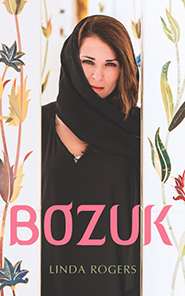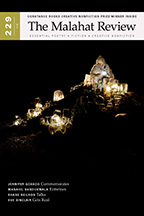Reviews
Fiction Review by Clarissa Fortin
Linda Rogers, Bozuk (Holstein: Exile, 2016). Paperbound, 240 pp., $19.95.
 I don’t know much about politics in Turkey, the writings of Orhan Pamuk, or the trial of Iman al-Obeidi. I’m not sure whether this makes me an ideal audience for Linda Rogers’ newest novel, Bozuk. For a reader well-versed in Pamuk and the events surrounding the Arab Spring, it might provide interesting commentary. On the other hand, for curious readers who know little about those topics, Bozuk is an intriguing introduction.
I don’t know much about politics in Turkey, the writings of Orhan Pamuk, or the trial of Iman al-Obeidi. I’m not sure whether this makes me an ideal audience for Linda Rogers’ newest novel, Bozuk. For a reader well-versed in Pamuk and the events surrounding the Arab Spring, it might provide interesting commentary. On the other hand, for curious readers who know little about those topics, Bozuk is an intriguing introduction.
Rogers’ novel explores religious fundamentalism and rape culture in modern Turkey, the plight of Iman al Obeidi, the effects of alcoholism and neglect on children, and a host of other issues. Hers is a dense world populated with musicians, poets, journalists, children, and angels. It is grounded in modern political realities but ventures into the supernatural. Sometimes Rogers succeeds at blending all these disparate parts into a coherent whole, but her story often becomes fractured and confusing. Is this a meditation on memory or a travel memoir? Is it a love story or a ghost story? The author can’t seem to decide, and for this reason I found Bozuk both frustrating and engaging.
Bozuk, which means broken in Turkish, takes place in 2011. The Arab Spring is underway. Libyan lawyer Iman al-Obeidi is gang-raped by Libyan soldiers and, after accusing the soldiers, she is held under house arrest in Tripoli. A petition is to be presented to President Erdogan of Turkey in the hope he can negotiate her release. Madeleine Turka, a Canadian, signs that petition. Rogers’ protagonist is a lonely sexual therapist, who makes her living giving “hand releases” to elderly clients. After a patient leaves her an unexpected sum of money in his will, she decides to travel to Turkey. Madeleine has a familial connection to the country—her father may have had Turkish heritage. She goes in the hopes of seeing justice for Iman and of finally laying to rest her grief and confusion over her father’s sudden death. She wants to hear God "in the silence of snow,” like a poet in an Orhan Pamuk novel. Her travel goals are lofty: “I want to know if God is good, or not, if I can live with goodness as the definition of highest power."
Madeleine befriends a Turkish journalist named Güzel, and the two embark on a meandering journey through the mosques and markets of Istanbul. “Turkey is a contradiction,” Güzel tells Madeleine. “There are no easy answers in a country where half the population wants to be European and the other half wants to be Persian.” Güzel and Madeleine have an electric connection. They discuss everything from Pamuk, to Islam, to Turkish identity. The dialogue is enticingly quick and clever and I wanted to stay there in the streets of Istanbul with them for much longer. We do not stay in Turkey though. Chapters alternate between Madeleine's trip, and her memories of a harrowing childhood in British Columbia. A dead father and an alcoholic mother leave young Madeleine to fend for herself. Her Tom Sawyer-esque adventures with a runaway boy have a certain sad charm, but as a reader I grew impatient with these sections. They seem part of a different book.
Rogers demands attention from her readers. Madeleine is an introverted autodidact. Her inner dialogue is peppered with historical and literary references. She jumps rapidly from past to present and sees symbols everywhere. “Even today I cannot tell the difference between my real memory and magical thinking,” she admits. Her moral convictions are strong but she lacks self- awareness. “I am against scriptures that degrade women and men who would be women,” she announces. These convictions lead to presumptions about the veiled Muslim women who populate the country where she is a tourist. Rogers’ protagonist blithely compares veil-wearers to “a gathering of black and grey crows," and comments incessantly about how hot and confined they must feel. “I know it’s presumptuous of me to pass judgement,” Madeleine admits. "I sound like George Bush when he talked about freedom before bombing the bejesus out of Baghdad.” One character asks what she can possibly know "about the reality of being a woman, even an educated woman, in this part of the world?” An excellent question, but one that goes largely unexplored. Madeleine does not interact meaningfully with any of the veiled women she pities. All of her revelations and philosophical conversations happen with Western men and women, and Turkish men. The silence of women is mourned and yet Rogers never gives a Muslim woman agency as a character in her story. For a novel so concerned with the plight of Iman al-Obeidi and the “veiled women” of Turkey, this seems a narrative misstep. Yet, Bozuk is still beautifully written. In one passage Madeleine remembers seeing a Santa Claus parade with her parents. She recalls them “not touching, each of them together, each of them alone, outlined in light, with the pale winter sun in front of them…I was four years old, standing in their shadows.” Rogers imbues the most basic visual memories with transcendence.
In her forward, Rogers reminds readers of the violence women in Turkey endure regularly. Before reading Bozuk, I didn’t know about Iman al-Obeidi or Ozgecan Aslan, the Turkish student who was murdered after resisting rape. This novel is an uneven one certainly, but the author’s attempt to memorialize the victims of gender-based violence in Turkey is admirable, as is her evident compassion for her lonely protagonist, and her fascination with the city of Istanbul. I now have questions about Orhan Pamuk, Erdoğan, Ataturk, and jazz music among other things. In fact, Bozuk left me with more questions than answers, and for the right reader that’s not a bad thing at all.
—Clarissa Fortin









